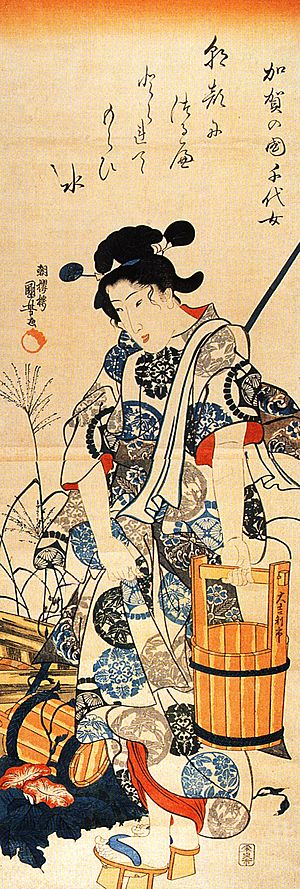Fukuda Chiyo-ni facts for kids
Fukuda Chiyo-ni (also known as Kaga no Chiyo) was a famous Japanese poet and a Buddhist nun. She lived during the Edo period (1703-1775). Many people believe she was one of the greatest poets of haiku. Haiku are very short poems. Some of Chiyo's most well-known poems include "The Morning Glory" and "Putting up my hair."
Chiyo-ni was important because she was one of the few women haiku poets in old Japanese literature. Before her, poems by women were often ignored. She started writing haiku when she was only seven years old. By age seventeen, she was very popular across Japan. She kept writing poems throughout her life.
She was inspired by the famous poet Matsuo Bashō. However, Chiyo-ni developed her own unique style. Her dedication to poetry helped her career. It also made it easier for other women to become poets. Chiyo-ni is known for encouraging cultural exchange between countries.
She is perhaps most famous for this haiku:
morning glory!
the well bucket-entangled,
I ask for water
Today, the morning glory flower is a favorite in her hometown. This is because she wrote many poems about it. The Shokouji temple in Hakusan has a display of her personal belongings.
Contents
Chiyo-ni's Life Story
Chiyo-ni was born in February 1703 in Matto, which is now Hakusan. Her father worked with scrolls, which are like old Japanese paintings or writings that can be rolled up. From a young age, Chiyo-ni learned about art and poetry. She began writing haiku poems when she was just seven. By the time she was seventeen, her poetry had made her very famous across Japan.
Her Connection to Nature
Most of Chiyo-ni's poems are about nature. She believed that nature and people were connected. Her own life showed this connection. She lived a simple and humble life, just like many haikai poets. She was very observant and studied the unique things around her. Then she wrote them down in her poems.
Learning from Great Poets
When she was twelve, Chiyo-ni studied with two haiku poets. These teachers had learned from the very famous poet Matsuo Bashō. Many people in her time saw Chiyo-ni as a true follower of Bashō. This was true both in her poetry and in her kind way of looking at the world. She learned Bashō's style of writing when she was young. But she also grew into an independent poet with her own special voice.
Chiyo-ni knew that people saw her as Bashō's heir. She even wrote a poem on a picture of Bashō:
To listen,
fine not to listen, fine too...
nightingale
This poem seems to say that she learned from him, but she also found her own path. She did not just copy him.
Family Life and Becoming a Nun
Around 1720, Chiyo-ni married a man who worked for a family in Kanazawa. They had a son, but he sadly died when he was a baby. Her husband also died from an illness soon after, in 1722. Chiyo-ni valued her freedom very much. Even though she felt lonely, she did not marry again. She went back home to live with her parents.
After her husband died, Chiyo-ni likely lived with and took care of her elderly parents. She also worked in her family's scroll business. She wrote a poem about this time:
parents older than I
are now my children
the same cicadas
After her parents passed away, she adopted a married couple to continue the family business. In 1754, when she was fifty-two years old, Chiyo-ni decided to become a Buddhist nun. She said she did this "not to leave the world." Instead, it was "to teach her heart to be like the clear water which flows night and day." Chiyo-ni shaved her head and began living in a temple with other nuns. She took the Buddhist name Soen. She continued writing and lived a simple, peaceful life as a haikai poet.
Her Legacy
In 1764, Chiyo-ni was chosen for a special task. She had to prepare a gift for Maeda Shigemichi. He was the daimyō (a powerful lord) of her region. The gift was for the Korean Delegation visiting Japan. Chiyo-ni created 21 artworks, each based on one of her haiku poems. She then delivered them herself.
Chiyo-ni passed away in 1775.
See also
 In Spanish: Chiyo-ni para niños
In Spanish: Chiyo-ni para niños
 | May Edward Chinn |
 | Rebecca Cole |
 | Alexa Canady |
 | Dorothy Lavinia Brown |


